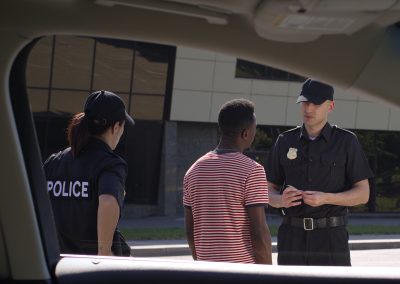Case Western Reserve University has some of the latest information on comprehensive mindfulness research. Mindfulness programs are being implemented into corporate culture, business and management education, and gaining ground among scientifically and medically minded people. The U.S. armed forces is on board too. That’s right: Even the USMC and Army are now using mindfulness to improve workplace functioning, as well as mindfulness-based stress reduction (MBSR) for our returning war veterans. Mindfulness training has been found to be a viable—and healthier—alternative to pharmaceuticals for treating PTSD, depression, and chronic pain.
So if such disparate professions have all arrived at the same conclusion, why isn’t law enforcement enthusiastically reaping the many benefits of mindfulness training?
I have a theory: Most of us cops are proud and as a result we don’t like change. But I also know that cops are practical and I hope to show you some of the tangible benefits of mindfulness.
Change Is Inevitable
We may not like change—myself included—so why fix something that isn’t broken? Right? We go to work each day knowing that there’s some chance that we might not make it home. Isn’t that enough?
No one in the field of mindfulness would say that we as people need to change intrinsically. But mindfulness can help us to accept the things we often can’t change. We can change our relationship (or perspective) with the way things already are. Now, historically, many police departments have been reluctant to offer or implement mindfulness programs because many mistakenly see mindfulness as something touchy-feely, esoteric, mystical, or spiritual. In reality and by definition, mindfulness is non-judgmental, moment-to-moment awareness. Put another way: It’s the act of paying attention on purpose.
While new to most of us in Western culture and society (and it’s much lesser known to those of us in the southern states and in law enforcement, believe me), the fact is that mindfulness has been around for over 2,500 years. In our line of work we call that a “clue.”It emerged from Buddhist philosophy and has been fine-tuned for millennia. That longevity tells us that it’s worked for at least some.
Pepperdine University’s Graziado School of Business and Management has conducted some excellent research on the subject of mindfulness that included experts in business and management, as well as psychologists and neuroscientists. Relying on more than 4,000 scientific papers on various aspects of mindfulness, the researchers streamlined all the info into a guide of sorts that documents the impact of mindfulness on how people think, feel, act, and relate in their performance in the workplace. This was published in the Journal of Management.
Following is a summary of their conclusions.
- Mindfulness has an overall positive impact on human functioning (entirely). Psychological disciplines, neuroscience, and medicine all noted improvements in attention, cognition, emotions, behavior, and physiology (sounds like list of improvements for LEO to me)
- Mindfulness specifically improves three qualities of attention (we should be attentive as cops, right?): stability, control, and efficiency. The human mind is estimated to be in a state of wandering in nearly half of our waking hours, but mindfulness is a stabilizer for our attention, and those who received basic mindfulness instruction were shown to be more vigilant for longer periods for visual and auditory (listening) tasks.
- Mindfulness is considered an “individual quality,” but it affects both interpersonal behavior and workgroup relationships.
- Mindfulness improves relationships through greater empathy and compassion—staple requirements for public safety work.
- Mindfulness can improve effective leadership skills and encourage teamwork. (Is it just me, or does this sound like police supervision textbook?)
The challenge for those of us who know the good mindfulness can bring to public safety is to translate these skills and inject them into our respective departments and even core training that begins with police academies and cadets. I live and work in Texas and this is can be a tough sell to most any of my fishing and hunting buddies. My rather lofty goal is to create a law enforcement center for mindfulness (in Southeast Texas). Until then I will be researching and gathering information on possible grants and funding for such a center.
Conclusion
Become an advocate for each other, and start a mindfulness program or group with your own agency. Don’t expect a waiting list or line of folks to jump on board your mindfulness train. This is more like a one here and one there campaign. It’s essential that you don’t push it on anyone.
But with regular and consistent practice, people will want to know what you are doing differently. You will be noticed as “that guy” who seems to have “an ancient Chinese secret.” Not too far from the truth–Zen and Taoism are just as skillful at mindfulness.










0 Comments